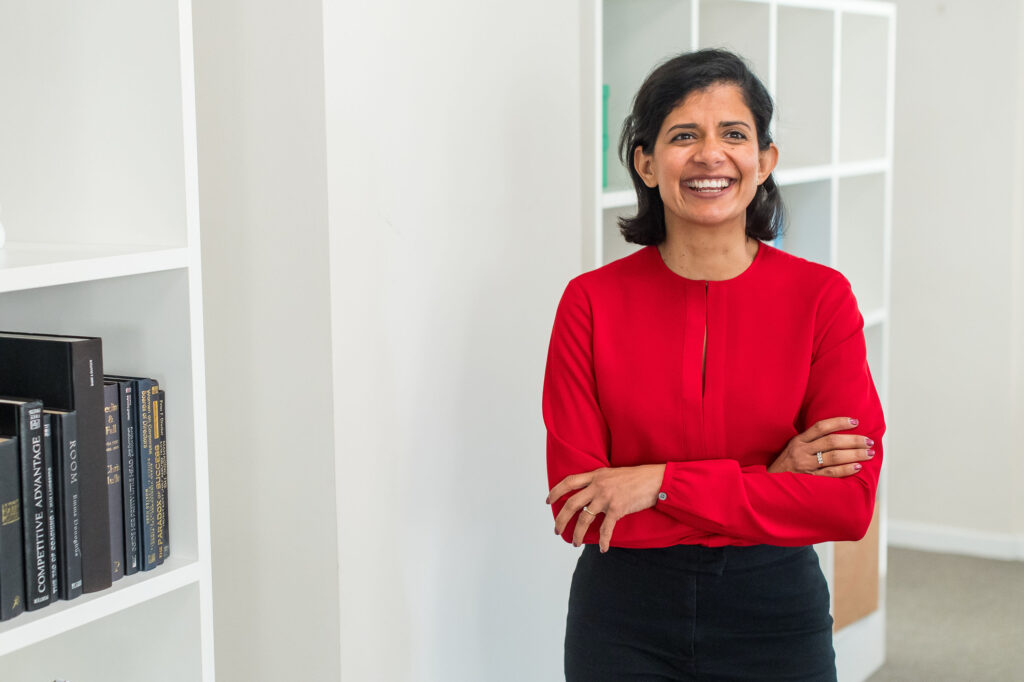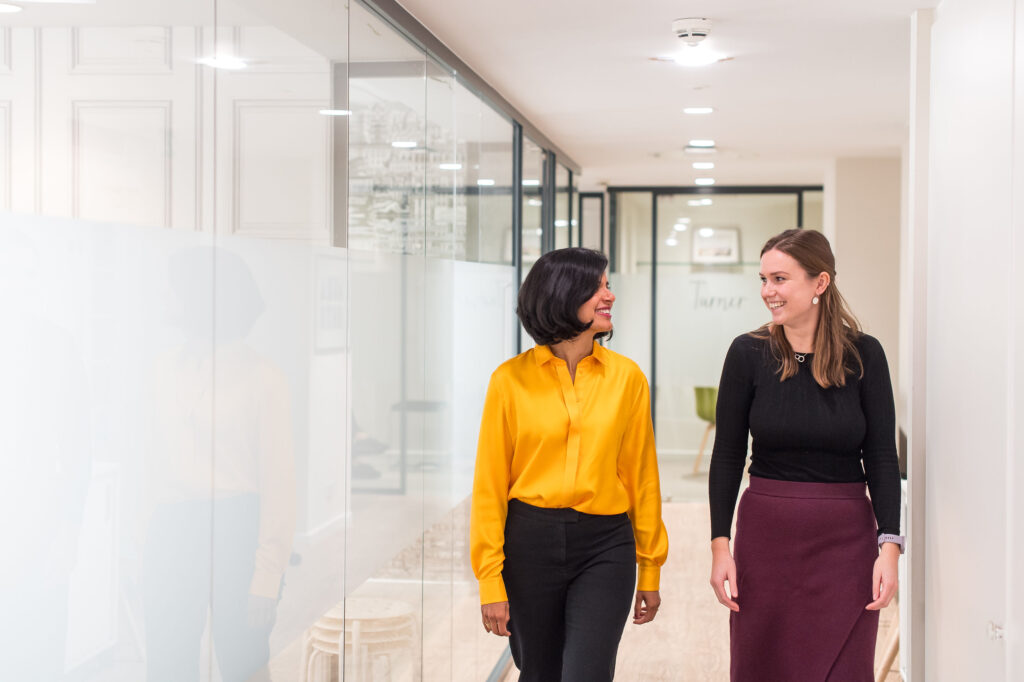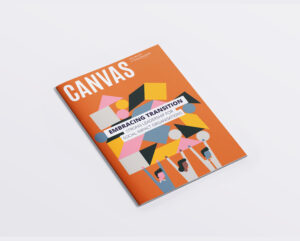
Meet Vidhu Sood-Nicholls – Saxton Bampfylde’s new Consultant who has joined us in a multi-practice group role. Formerly Director of Fundraising at Teach First, Vidhu’s multi-sector experience has spanned the commercial, not-for-profit and public sectors.
Vidhu has a passion for excellent people leadership and uncovering the best, if not always most obvious, talent and will utilise her 18 years’ experience to support a range of different Saxton Bampfylde clients and organisations to do just that. We are delighted to introduce Vidhu as she shares her insights and experiences from three different career paths and highlights the common threads which bring them all together.
Past, Present and Future – can you give us a brief history of you and how you came to be at Saxton Bampfylde?
The reason I am here is a firm belief in equality and justice and a restless curiosity about why, reflecting on it these are themes that tie my career together. Growing up in Zambia, very early on in my childhood I had this sense that the world wasn’t fair. I wanted to understand why and have a distinct memory of asking my mother that question when I was about eight or nine and getting an answer that I wasn’t entirely satisfied with. She did say that it is within all of us to do something about it, and I think for me that was quite a defining moment.
I have a degree in law, spent time at the UN, taught in an inner-city school, worked in banking and then in a charity including in a senior fundraising role. And, now I am here at Saxton Bampfylde. As my career has progressed, I have become more acutely aware of the impact that the right leaders and leadership can make on an organisation. The reason I am here is because I am excited about the prospect of finding people who will accelerate the pace and impact of some of the most significant organisations, ultimately making society fairer.
With that broad portfolio of sectors in your career, which areas will you focus on at Saxton Bampfylde?
With my varied background, I am delighted that my focus is across many different areas, helping to identify interesting, innovative, and vibrant new leaders. Some of the areas I will be working with include: Social impact; Schools; Higher Education; Arts and Culture; Commercial and supporting the Board practice.
I am looking forward to bringing my perspectives and experience to the team, and to making a difference in finding the leaders who will bring change and fresh perspectives to their organisations.

New to executive search, but certainly not new to leadership, how can your experience bring different perspective to candidates and clients?
I wouldn’t describe myself as a fundraiser, but I lead a successful fundraising team; I wouldn’t call myself a teacher, but I would like to think I changed a few lives along the way; I would never call myself a banker, but I really enjoyed working in the commercial world. I have had all those jobs, thoroughly enjoyed them and learned how to and equally how not to lead along the way. I think that does give me a different view of leadership, finding the things that have emboldened me and the things that have surprised me. I have also regularly asked who are the people who brought the best out in me and how do I bring the best out in people I meet and work with.
I like to think about what I can add. What do I offer that brings a new way of looking at something or someone’s experience. I have always had a natural sense of curiosity, and I believe that is really important in this job. I don’t believe in always appointing the obvious candidates. In my view it is important to listen and understand where an organisation is at a point in time and consider who is the best person to take that organisation, its people and its customers or beneficiaries with them as they journey to the next point. I am keen to build and share my sense of curiosity and how that informs my perspective.
From your cross-sector perspective how can organisations be more inclusive? Are there those who are doing well and can be a lesson to others?
Most organisations do need to be doing much more to address under representation but the need for inclusivity goes much further, organisations need to approach both diversity and inclusivity thoughtfully and intentionally. Having a wide breadth of policies and plans to implement and measure their progress is a good place to start but I believe it has to come from the leaders. You can have inclusive teams and departments, even organisations, but if the person who fundamentally heads it all up isn’t inclusive it doesn’t matter what there is in place.
What in your view makes the best leader?
While I know and don’t underestimate the importance of technical knowledge and skills, my belief is that these can be deepened and honed in a job. The values, behaviours and characteristics of leaders are much harder to learn. I was once given advice to hire for values and behaviors over technical skills; it is advice that has served me well.
Leadership at its very heart is about people. It is also about progress, and in leadership there is something about collectively lifting the world. I think it is about people who lead for the world rather than achieving the status of a leader. Fundamentally a good leader will help people thrive. Being kind is such an understated value. Kindness is being able to say well done, and giving feedback when things aren’t going right. It is vital that leaders are able to articulate the direction of an organisation and keep people on that path. They also need to be able to be honest when people veer off the path and work to bring them back.
There is certainly an importance of timing and finding the right leader at the right moment in an organisation’s lifecycle, which will not always remain constant nor the same person. That is the joy of my work now – working with clients to understand who is right for their organisation at this point in time and then being mildly obsessed with finding the person who is going accelerate the pace and impact of the organisation.
The concept of leadership has definitely changed in my view. I think the organisation where a leader is put on a pedestal and as the face of an organisation has become quite outdated. People are looking for humility in their leaders. One of my work heroes talks about ‘servant leadership’ – that a leader is there to serve an organisation and to deliver its purpose and not to focus on themselves. I think I can get behind that sort of leader and it’s the sort of leader I aspire to be.

Does cross-sector movement happen enough? Should more be done to encourage it?
In my experience I would say probably not. It does feel like a generational difference however, with more people of my generation gaining a professional qualification early in their career and while they moved organisations, they wouldn’t really move profession, or even sector, readily. However, this has been an evolution from previous generations where people didn’t move organisation at all.
I do believe that future generations will think differently and there will be more movement – well I hope so – as I believe that it does bring interesting diversity of thought to organisations and sectors. At the end of the day people are people, many of the work pressures are similar and they all need to build an empathy with their colleagues and teams. The benefit of cross sector exposure is you see the similarities in organisations and you can build on those. Where things worked somewhere else you can ask how would it apply in this context – what would it need to look like if we wanted it to work in this setting.
To quote another one of my work heroes “We live in a world full of complex problems. These problems cross boundaries. Yet most leaders do not.” That is where cross sector experience comes into its own.
What have you been most proud of in your professional career to date?
Genuinely, I am most proud to have had four different careers so far, and I reckon I have at least 15 years left to work so I am excited about what those will hold. I have achieved things in each of these roles of which I am proud but being able to move across sectors and build on what I have learned in my last job is something that makes me most full of pride.
Have you discovered anything new in lockdown?
I have developed my baking skills with my daughter. We make a mean brownie, but ensure they are made in small batches as it is just too tempting to eat them all!
On a slightly less sugary indulgence level, I have learned to meditate. I’ve practiced yoga for years but proper meditation eluded me as I wasn’t able to be still long enough. However, without the commute to contend with during the earlier months of the pandemic I found I had more time to really learn the art and skill of meditation, and I love it. I don’t have as much time for it now that we are moving to a more hybrid model of work, but I will keep it going as it has really helped me to be aware and present in everything I do.
With the choice – pop on a podcast or bury your nose in a book? And please share any good recommendations!
I love podcasts, and I listen to meditation ones regularly too, but for me it is always going to be a book. A Little Life by Hanya Yanagihara. I am a fan of a challenging subject matter – my favourites are those that have me in tears until two in the morning!
